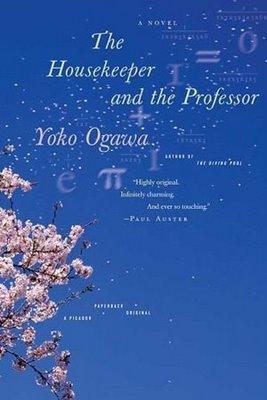The Housekeeper and the Professor

If you want to read a book that is punch-you-in-the-gut beautiful, then pick up Yoko Ogawa's novel, The Housekeeper and the Professor. This novel is a careful meditation on memory and communication. The precision of the plot is such that you won't know what hit you until you finish the very last sentence; you'll feel as moved as you do gutted.
The premise of the novel is seemingly simple: the plot revolves around the relationship between a housekeeper and a once-famous mathematician, the latter of whom was in a car accident that left him brain damaged. This man's short term memory is shot; it lasts for only eighty minutes. Armed with only decades-old memories and his formulas and theories, the novel shows that despite such loss, affection and love are still possible. Math becomes the language that penetrates this man's mind and allows him to make sense of a world that has changed without him knowing it.
There are no bleeding heart miracles or learning curve love affairs in this book. Ogawa is wise enough to let the novel's plot unfold without explaining too much. In this way, Ogawa understands the mystical power of numbers and memory—that what is unknown is as moving and powerful as what is known. As the Professor says about God, you have to acknowledge the truth of what can not be disproved. Thus, although the Professor may not have access to memory, the ties that bond are there; they cannot be disproved, and thus, they must exist.
The complexities of memory and love are present in the relationship that forms between the housekeeper's son and the mathematician. The professor may not remember Root, (the son’s nickname) after eighty minutes have passed, but upon each introduction, he is as paternal, protective, and loving as before. He feels something behind concrete memory—an essence, an idea, a certain truth. Thus, memory becomes something of an iceberg, both seen and unseen.
Ogawa accomplishes the seemingly impossible; she makes numbers exquisite, exotic, and alluring. The language of love is contained in the pluses and minuses and equal signs that dot the communication between the characters. The poetry of the formulas will curl in and around the reader's mind so they can't help but fall into them.
By the end of the novel, math becomes the decoder ring for the relationship built between the housekeeper, her son, and the professor. The journey they take is one that is equal: the son and mother discover one another as much as the professor discovers them again and again. You'll never look at a prime number in the same way.
This review makes me want to find the book and start reading. Thank you - I hadn't heard of the book before.